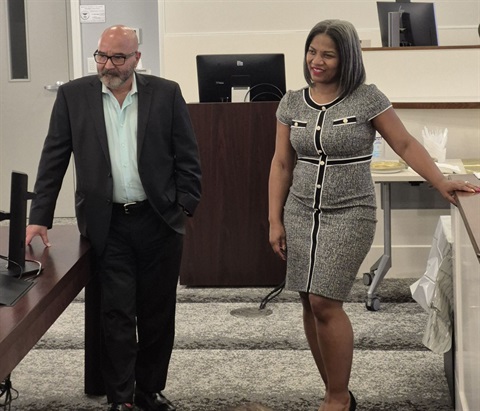Specialty Dockets celebrate graduates with fresh starts and new goals
Published on October 07, 2025

The Franklin County Domestic Relations and Juvenile Court Specialty Dockets celebrated graduations for Juvenile Recovery Court, Family Recovery Court and Empowerment Court in September.
The three graduates – one from each program – celebrated with family, friends and court staff at the special events in Courtroom 41 during the week of Sept. 22.
Judge Lasheyl Stroud, who oversees the Specialty Dockets program, congratulated participants and urged them to aim high. She praised the work of court staff and community partners who make the Specialty Docket programs possible.
Each graduate was given a paper copy of their court record, which they could symbolically tear up because their charges will now be sealed and expunged.
“You get a fresh start,” Judge Stroud said.
Franklin County Domestic Relations and Juvenile Court operates several specialty dockets that combine court oversight with treatment, counseling, and education. These programs are designed to address the root causes of court involvement and to help families and youth achieve stability and long-term success.
- Empowerment Court – Serves youth who are victims of human trafficking. The docket connects participants with community services that support recovery, safety, and personal growth.
- Family Recovery Court – Works with parents struggling with substance use disorders. The program emphasizes treatment and accountability, with the goal of helping parents maintain sobriety and provide safe, stable homes for their children.
- Juvenile Recovery Court – Focuses on youth affected by drugs or alcohol. It combines treatment, supervision, and support to reduce substance use, prevent reoffending, and encourage healthier attitudes and decision-making.
These specialty courts reflect a broader effort by the court to address underlying challenges, such as addiction and trauma, through collaborative solutions.
The young man who graduated from Juvenile Recovery Court said he is happy to move forward with a healthy life.
“It feels good, I’m not going to lie,” he said.
The young woman who graduated from Empowerment Court said she dreams of becoming a phlebotomist.
“I’m hopeful and determined about the changes ahead,” she said.
The mother of six who graduated from Family Recovery Court said she’s thankful to have custody of her children and a job.
“I’m forever grateful to Recovery Court,” she said.
The graduates also received certificates and celebrated with a lunch of pizza and cake after their ceremonies.
“The specialty dockets are an opportunity for us to demonstrate community,” Judge Stroud said.
Court staff, prosecutors, defense attorneys, local agencies, and businesses all contribute to providing what participants need to achieve their goals, Judge Stroud said.
Nate DeMars, the founder and owner of Pursuit, a Short North men’s clothing store, also congratulated the Juvenile Recovery Court graduate. Pursuit’s [Good] Intentions program provided him a new custom-fitted suit for the graduation.
The ceremonies also were attended by Magistrate Larry Sanchez, Magistrate Chynna Kelley and Magistrate Terrence Scott, as well as representatives from the counseling and treatment programs who had worked with the Specialty Docket program participants. Many shared words of encouragement with the graduates.
“I am so proud of you,” Magistrate Kelley said. “Beyond proud.”
Magistrate Sanchez spoke of the many obstacles participants face to reach graduation and the resilience they show to overcome these obstacles.
“She has worked really hard,” he said of the Empowerment Court graduate. “She kept getting up again and again and again. What she’s done is not easy.”